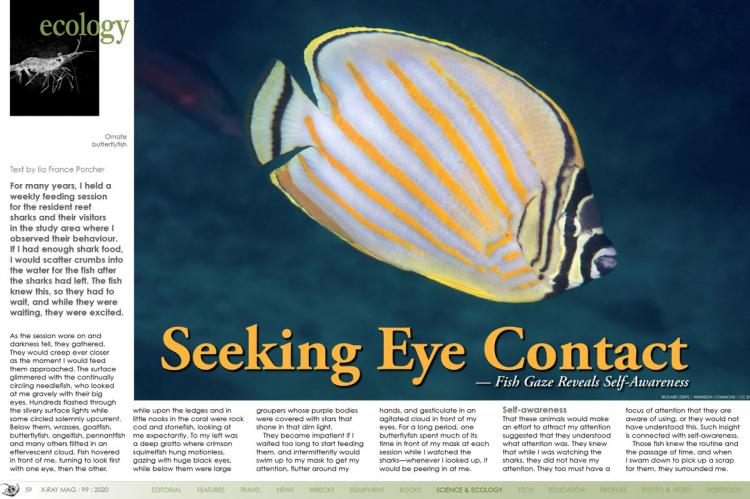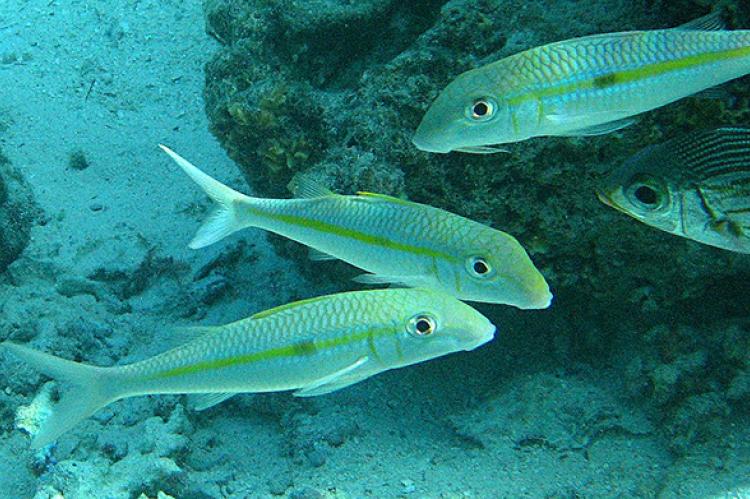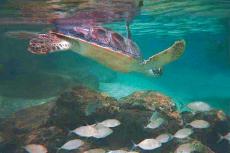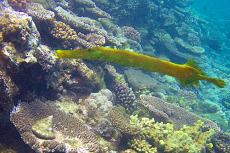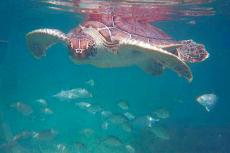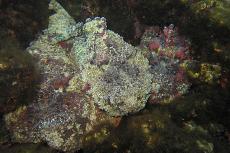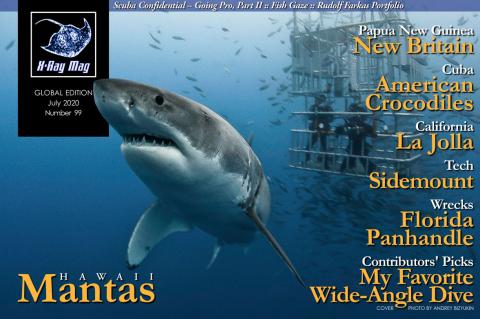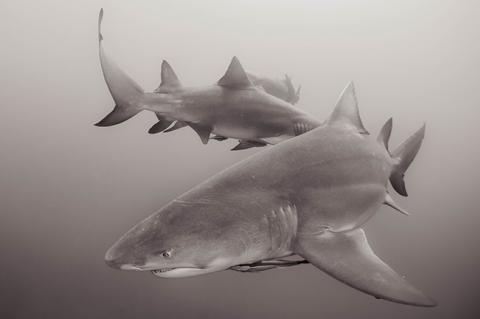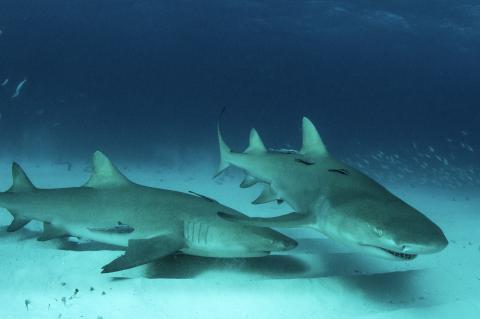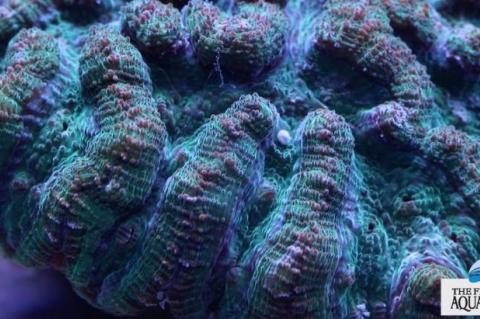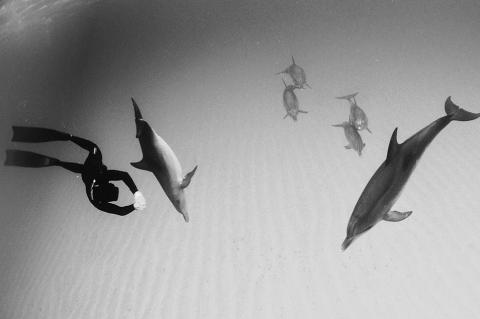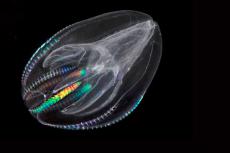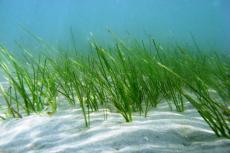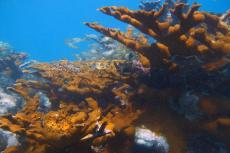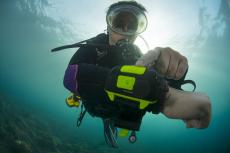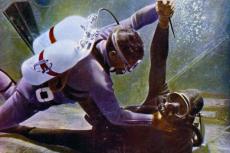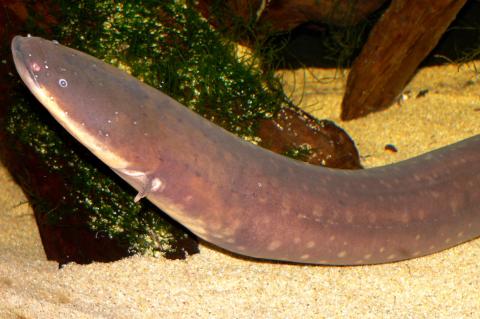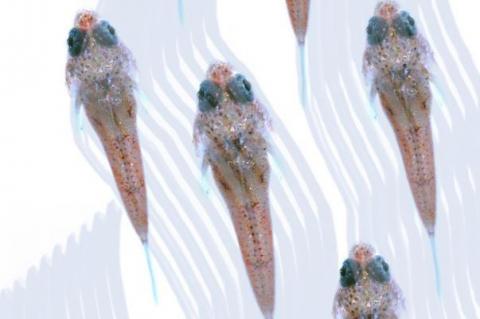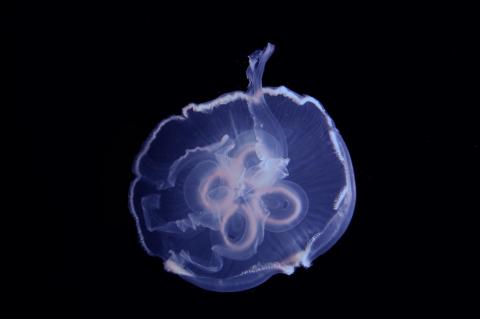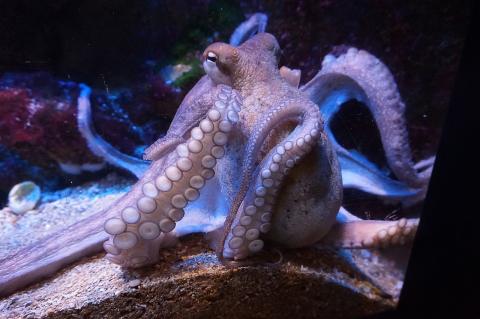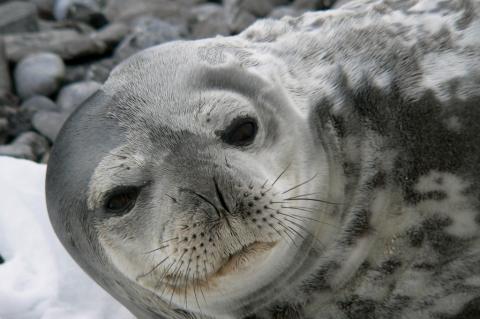Seeking Eye Contact: Fish Gaze Reveals Self-Awareness
For many years, I held a weekly feeding session for the resident reef sharks and their visitors in the study area where I observed their behaviour. If I had enough shark food, I would scatter crumbs into the water for the fish after the sharks had left. The fish knew this, so they had to wait, and while they were waiting, they were excited.
Tags & Taxonomy
As the session wore on and darkness fell, they gathered. They would creep ever closer as the moment I would feed them approached. The surface glimmered with the continually circling needlefish, who looked at me gravely with their big eyes. Hundreds flashed through the silvery surface lights while some circled solemnly upcurrent. Below them, wrasses, goatfish, butterflyfish, angelfish, pennantfish and many others flitted in an effervescent cloud. Fish hovered in front of me, turning to look first with one eye, then the other, while upon the ledges and in little nooks in the coral were rock cod and stonefish, looking at me expectantly. To my left was a deep grotto where crimson squirrelfish hung motionless, gazing with huge black eyes, while below them were large groupers whose purple bodies were covered with stars that shone in that dim light.
They became impatient if I waited too long to start feeding them, and intermittently would swim up to my mask to get my attention, flutter around my hands, and gesticulate in an agitated cloud in front of my eyes. For a long period, one butterflyfish spent much of its time in front of my mask at each session while I watched the sharks—whenever I looked up, it would be peering in at me.
Self-awareness
That these animals would make an effort to attract my attention suggested that they understood what attention was. They knew that while I was watching the sharks, they did not have my attention. They too must have a focus of attention that they are aware of using, or they would not have understood this. Such insight is connected with self-awareness.
Those fish knew the routine and the passage of time, and when I swam down to pick up a scrap for them, they surrounded me. Needlefish hung, pointing at me at the surface, from my mask all the way across the open circle of the feeding site.
So, I would scatter a handful of the scrap meat to the squirrelfish and cod, pushing larger chunks deeper for the groupers; spray a handful on the surface for the needlefish; several handfuls around for the wrasses, butterflyfish and goatfish; a handful to my right to the fish waiting there; and then, begin all over again, trying to make sure that each patiently waiting creature got some. I alternately fed them and cruised around, whereon they covered my lookout, searching for crumbs that might have dropped, and accompanied me in a giant, glittering cloud, making it problematic to sneak up on any shy sharks that might be cruising downcurrent.
For a long period, a yellow trumpetfish stayed companionably nearby and even drifted around the site with me, though it never appeared to be moving. Vertical in the water, and about half a metre long, it propelled itself subtly with its tiny rippling fins. I learnt what was truly motivating it when it suddenly shot vertically in front of my eyes and trapped a rainbow wrasse in its elongated mouth. The wrasse’s bright markings were visible through the trumpetfish’s transparent, yellow skin as it slowly swallowed it, while its companions fluttered near, watching.
Cooperation
A large school of sea perch attended the shark sessions, spending their time near the sand and feeding on the scraps, among which they favoured the red ones. These were usually too big for one fish alone, so a group of them would pick one up and carry it into the coral where they could all nibble it in private. Here was a demonstration of cooperation among them.
Once, when there were few scraps, I took the piece away from them and put it back on the pile. The perch came back and took that same piece, carrying it between them again, in spite of the presence of three dozen excited reef sharks. From time to time, I noticed groups of perch moving off with the red scraps when the food was first put on the sand, though usually at the beginning, I was too busy with the sharks to watch the fish.
Interaction
Months after I had stopped using that site, those fish were still in the vicinity, and remembered. When I passed through at odd times, I would hold my hands out to them, they swam into them, and I stroked them. I had fed birds all my life, but they never flew down around my shoulders when I went outside. Yet, that was what these exquisite birds of the sea would do.
Initially, the occasional large fish came through the shark sessions. I regularly saw blue jack fish (Caranx melampygus), titan triggerfish (Balistoides viridescens), and there was even a pair of gorgeous spangled emperorfish (Lethrinus nebulosus) who waited at the site each session. They were half-metre long, pale fish, with lavish decorations and solemn faces, moving languidly in midwater. Giant trevally (Caranx ignobilis) occasionally whipped into the sessions, and there was an enormous lone barracuda—likely an elderly individual—who often joined me. But as the years passed, no big fish came any more.
Moorea Island was badly overfished, and though there were “fisheries” authorities there, they would not interfere with poachers. Anyone who wished to make a lot of money was free to plunder as they wished.
Intelligent awareness
Another notable example of the intelligent awareness of fish developed while I was rehabilitating a sea turtle. The marine reptile had recovered from illness well enough to return to the sea, where it lay around in the shallows near the beach on the property my husband and I owned, in a cloud of fish. When I fed it, the fish ate the tidbits scattering around us. I counted about a dozen species of reef fish among them, but the most mobile and alert were small silver jack fish.
When I went to check on the turtle and feed it, the jack fish appeared around me in the lapping waves as I sat down to put on my mask, snorkel and fins. When I glided out, they surrounded me, swimming in formation with the leaders a metre in front. They escorted me to the sea turtle—I never had any trouble finding it as long as it was nearby.
While I fed the sea turtle, the fish formed a cloud around us, and though they took the particles of food drifting away, there was no greedy rush forward in spite of the hundreds of individuals present. In deeper water, the multispecies school filled the volume of a room.
When I returned to the beach, some of the jack fish always came with me, a few taking the lead, while others swam companionably around me. When the turtle and I swam together, they came too, but if the sea turtle roamed too far away, they would not follow. When looking for the sea turtle, scanning the water from the shore, I would often see them coming back, which told me the direction the turtle had taken.
These animals together seemed to form a companionable community, one in which I seemed to be accepted as a participant. Even a stonefish joined us. And a whitetip shark, who hunted the drop-off at the edge of the fringe reef, would perform a circle into the beach as it passed.
There was another beach on our property, about 50 metres away. As the sea turtle extended its range, sometimes it clambered out onto it, and I would go and carry it back. Its fish friends would be at our beach waiting for us by the time I arrived with the turtle on foot. On another occasion, my husband went to fetch the sea turtle in his kayak when it strayed too far. The fish were swirling around my feet as I waited on the beach, but when the kayak was still 15 metres away, they all went streaming out to meet it!
However, the most striking incident illustrating the faculties of those fish occurred when I was walking along on the large black rocks that lined the shore between the beaches, looking for the sea turtle, one day when it had strayed. The turtle’s fish came streaming towards me, and though I was high above the water, they saw me and milled around in the water below. Obviously, they recognized me from beneath the surface, though they had never seen me there before. I must have looked very different standing on the rocks above, than I did when underwater. Their awareness was surprising.
Debunking myths
Unfortunately, for centuries, fishermen’s tales have spread the idea that fish have the sensitivity of wood, and it was not until recreational diving became widespread that we were able to see them pursuing their lives in their own realm. Nevertheless, the idea that fish lack the brains to even feel pain is so widely accepted that it is taking a long time to debunk. So, as a diver, it is important to share your views of fish if you appreciate these enchanting creatures.
Sometimes, circumstances arise that allow us a glimpse into their inner lives. For example, one day on a dive, my husband and I met an enormous school of yellow striped snappers, each about 30cm long. When they drew near, I became fascinated by the sight of so many hundreds of them so close, blocking my view of anything else, and relaxed in the water, just looking at them. Incredibly, they responded to this by looking back!
Fish gaze
As I watched, hundreds of fish turned towards me, and one after another, they positioned themselves about 30cm in front of my face, each one taking a deep look into my eyes for a few seconds before moving on. That precise position was then taken by another fish. Their eyes were large and four centimetres apart, and their look was serious and intent.
Fishes’ faces filled my view as they continuously moved towards me to take, one by one, the position directly in front of my eyes and gazed back as I gazed at each one of them. This went on for a very long time and would have continued indefinitely, it seemed, had my husband not come into the cloud of fish to see what we were doing.
This experience with the fish changed my thoughts of them, for it was the first clue they gave me of their inner lives. On other occasions, I found that if I stopped moving and relaxed on the bottom, fish would come over to look at me. Then, on finding me looking so intently at them, they would come close and look into my eyes. I never had an opaque school around me again, but every time I tried, some fish came. One small, brown grouper with purple spots was so interested that it kept coming to look into my eyes even after I was swimming away.
Eye contact
Joe Hutto, an ethologist who was accepted into a flock of mule deer, wrote about one of the alpha males he knew:
“Babe became not just the biggest deer you ever saw but, more important, the most powerful creature who ever cared to look behind your eyes in a startling effort to make contact with you . . . Babe would meet you straight on, face-to-face—eye-to-eye—and make an effort to know not what you were, but who you were. By merely wielding those most powerful but gentle eyes, he would knock you and all your preconceived notions about human superiority and animal consciousness to their knees.”
In their way, the fish too, were seeking eye contact, as if the consciousness that joins us transcends the barriers between species.
Subjective states of fish
The subjective states of fish actually form a whole new dimension of discovery. And especially now that the oceanic ecosystems have been so devastated by overfishing, it is even more important that fish be given the appreciation they deserve, and that fishermen’s tales lose their power. Indeed, it is daunting how many people are proud of their efforts to catch a fish. They do not seem to see any irony or contradiction in claiming that fish are too brainless to even feel pain, while being so very proud that they are intelligent enough to outwit one. ■
To learn more, read the author’s previous articles in X-Ray Mag: “The Remarkable Intelligence of Fish” (issue #88), describing fish intelligence and their surprising capabilities, and “A Matter of Sentience” (issue #87), examining the question of why fishermen have denied fish feel pain, and how we know that they do.
Ethologist Ila France Porcher, author of The Shark Sessions and The True Nature of Sharks, conducted a seven-year study of a four-species reef shark community in Tahiti and has studied sharks in Florida with shark-encounter pioneer Jim Abernethy. Her observations, which are the first of their kind, have yielded valuable details about sharks’ reproductive cycles, social biology, population structure, daily behaviour patterns, roaming tendencies and cognitive abilities. Visit: ilafranceporcher.wixsite.com/author.
Download the full article ⬇︎
